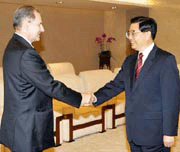 |
   |
|||||||||||||||||
|
07.08.2006Two years until Beijing 2008: IOC fails, activists call on athletes, sponsors to actPrague / Paris / Frankfurt / Washington, August 7, 2006 - Two years before the Beijing 2008 Olympic Games are to begin, an international coalition of human rights organizations has issued a joint statement, saying the International Olympic Committee has failed to protect Olympic ideals and calling on national Olympic committees, athletes and sponsors to take action. Citing continuing human rights violations and political propaganda abuse of the Games by the Chinese authoritarian government, they say boycott is one of possible options of protest. Olympic Watch, Reporters Without Borders (RSF), International Society for Human Rights (ISHR/IGFM), Solidarité Chine and Laogai Research Foundation say that despite human rights activists’ efforts, “the IOC has refused to face the reality in which Beijing 2008 is to take place” and that the current IOC leadership may be “either too cynical, or too incompetent, or both, to protect the Olympic ideals and take a clear stance on the continuing human rights abuses in China”. Therefore, they “call on National Olympic Committees and individual athletes to start discussing ways how they can protest the conditions under which the 2008 Games are to take place”, with one option being “full, publicly stated boycott of the Beijing 2008 Olympic Games”. They also point out that corporate sponsors of the Olympic movement have a special responsibility to prove that “their business philosophy does not condone propaganda abuse of the Games and human rights violations”. The full text of the statement follows below. Two Years until Beijing 2008 - joint statement of human rights organizations In two years from now, the 2008 Olympic Games are supposed to start in Beijing. The International Olympic Committee made its decision in 2001 based on promises by Beijing bidders that the human rights situation in China would be improving. That has not clearly happened, as documented by all independent monitors. The authoritarian government of China continues to execute more people every year than the rest of the world combined; imprison and torture people who peacefully exercise their right to freedom of expression and association; persecute Tibetan Buddhists, Uyghur Muslims, Chinese Christians and Falun Gong practitioners; deny talks about autonomy to the Tibetan people; endanger democratic processes in Taiwan and elsewhere in East Asia. Human rights are violated even in direct relation to the preparation of the Games as hundreds of thousands Beijing residents are evicted without compensation from their homes, and those who dare to protest are often persecuted. By all accounts, Beijing 2008 seems to be a tool for domestic and international political propaganda of the Chinese Communist Party, an unelected minority that has given up attempts to ideologically legitimize its rule over the Chinese people and is desperately looking for other paths to political legitimacy. The IOC has the obligation to protect the Olympic ideals of “harmonious development of man”, “human dignity” and “peace”, and to prevent the political propaganda abuse of the Games. Because of the importance of the Games to the CCP, it could easily exercise positive influence on the situation in China. We have made good faith efforts to engage the IOC through correspondence and even personal encounter, but the IOC has refused to face the reality in which Beijing 2008 is to take place. Time is running out. As minimum, the IOC could demand that the Beijing Organizing Committee of the Olympic Games not be personally linked to the perpetrators of human rights violations, the Chinese Communist Party. If the executive of IOC President Jacques Rogge continues to hide away from reality and only repeat Beijing leadership’s unsubstantiated PR claims of “progress”, it will prove that it truly is either too cynical, or too incompetent, or both, to protect the Olympic ideals and take a clear stance on the continuing human rights abuses in China. The Olympic movement should start seeking ways to replace its current leadership. With this leadership of the IOC, we see it necessary to look for help of others to make sure the Olympic Games have a positive, rather than negative effect on the human rights situation of the Chinese people. National Olympic Committees, individual athletes, and even Olympic sponsors have the obligation and opportunity to act to protect the Olympic ideals and internationally recognized human rights. We therefore call on National Olympic Committees and individual athletes to start discussing ways how they can protest the conditions under which the 2008 Games are to take place. Among the several options at hand are: • full, publicly stated boycott of the Beijing 2008 Olympic Games • staging peaceful protests in Beijing during the Games • including Chinese, Tibetan and Uyghur exiles in their teams and delegations • visiting human rights defenders in prison. Olympic Watch and other human rights organizations are ready to assist them in finding the most appropriate ways, depending on the developments between now and the beginning of the Games. Corporate sponsors of the Olympic movement and of the 2008 Olympic Games also have an opportunity to show their commitment to corporate social responsibility. They should make it clear to the IOC and to BOCOG that their business philosophy does not condone propaganda abuse of the Games and human rights violations. Time is truly running out. The IOC, National Olympic Committees, individual athletes, corporate sponsors and other citizens of the world have an obligation to show their solidarity with other human beings, and a great opportunity to do so. August 7, 2006 Olympic Watch Reporters Without Borders (RSF) International Society for Human Rights (ISHR/IGFM) Solidarité Chine Laogai Research Foundation |
|||||||||||||||||
|
||||||||||||||||||
